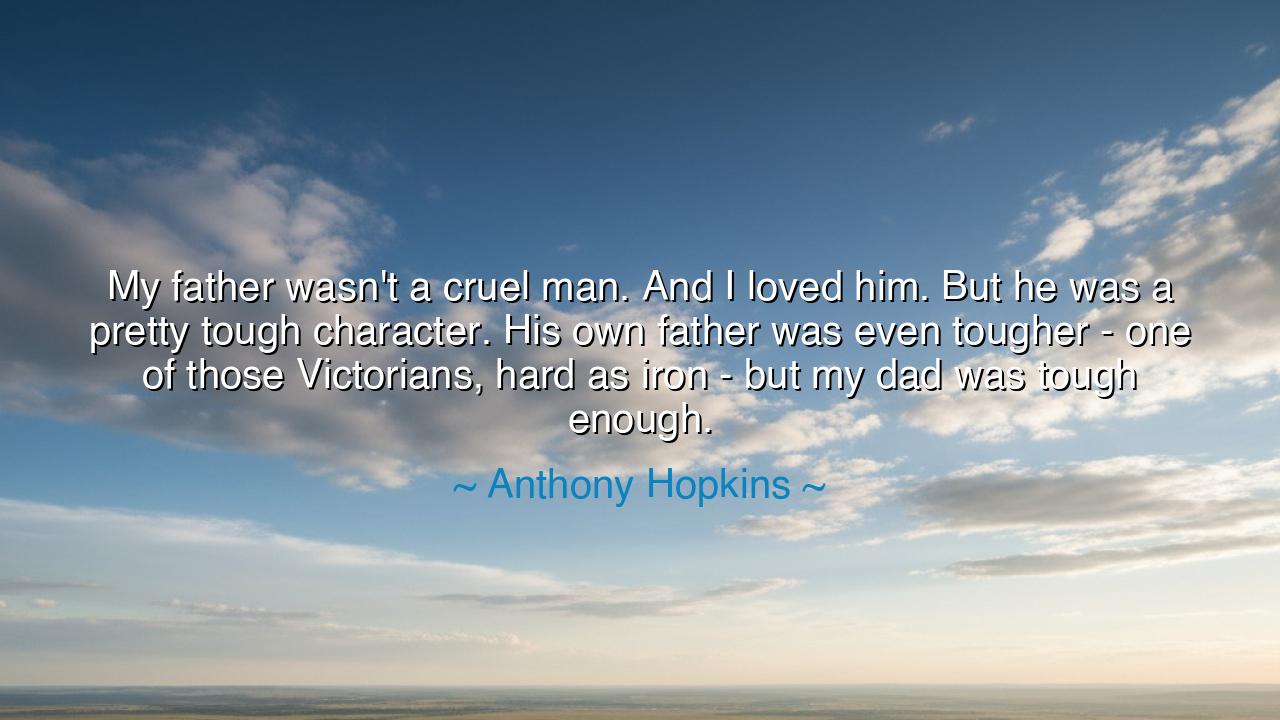
My father wasn't a cruel man. And I loved him. But he was a
My father wasn't a cruel man. And I loved him. But he was a pretty tough character. His own father was even tougher - one of those Victorians, hard as iron - but my dad was tough enough.






The words “My father wasn’t a cruel man. And I loved him. But he was a pretty tough character. His own father was even tougher — one of those Victorians, hard as iron — but my dad was tough enough,” spoken by Anthony Hopkins, carry within them the deep echo of generations — a lineage of endurance, discipline, and restrained emotion that shaped men of an older age. Beneath their quiet simplicity lies a portrait of a world forged in hardship, where tenderness was not easily shown, yet love endured through strength, not sentiment. Hopkins, in recalling his father and grandfather, does not speak with bitterness but with reverence — an acknowledgment that toughness, though difficult to bear, was once the language through which fathers expressed their devotion.
In his words, one hears the clash between eras — the Victorian hardness of his grandfather, the iron discipline of an age that prized duty over comfort, and the slightly softened resolve of his father, who inherited that hardness but allowed it to bend just enough for affection to pass through. Hopkins’s reflection stands as a bridge between old and new, between the fathers who believed love meant protection through strength, and the sons who yearned for gentleness yet understood the world that made such men unyielding. To call a man “tough enough” is not condemnation, but respect — for toughness was not cruelty; it was armor, worn by those who had no choice but to fight through life’s storms.
The Victorian man, “hard as iron,” belonged to an age of labor and survival, when tenderness was a luxury and resilience a necessity. Such men worked through exhaustion, held families together through scarcity, and buried their pain in silence. Their love was not spoken — it was built into the walls of the home, into every meal earned through sweat, into every stern glance that hid concern. Hopkins’s father, shaped by such a legacy, carried that inheritance of endurance but softened it, even if only slightly. “He wasn’t cruel,” Hopkins says, as if to remind us that strength can exist without brutality. His father was not a tyrant but a man of his time — flawed, firm, but steadfast in his way of loving.
The ancients would have understood this balance between strength and love. The philosopher Marcus Aurelius, emperor of Rome, wrote of his own father’s character — not indulgent, not soft, but guided by reason, integrity, and restraint. He praised him not for affection, but for virtue, for being a man who did what was right without seeking reward. Such was the ideal of fatherhood in many ages past: to build the world, not through comfort, but through constancy. And yet, like Hopkins, Aurelius also carried the silent ache of distance — the longing for tenderness within duty. Thus, across centuries, the story repeats: fathers made of stone raising sons who dream of gentler light, yet who, in time, come to see that the stone itself was love in its own unspoken form.
There is a lesson here, ancient and eternal. Hard times forge hard people, and those who survive them carry both their scars and their strength forward. But with each generation, something softens — not in weakness, but in understanding. Hopkins’s reflection reveals this evolution: from the iron of his grandfather, to the tempered steel of his father, to the artist he himself became — a man who learned to feel deeply and speak openly of emotion, even as he honored the stoic lineage from which he came. Thus, every generation refines the balance between toughness and tenderness, ensuring that strength remains, but that warmth is not lost.
Consider the story of Ernest Hemingway, whose father, like Hopkins’s, was a stern and disciplined man of science — practical, exacting, and emotionally distant. Hemingway both admired and resented that severity, and it shaped his art — his obsession with courage, control, and dignity under pressure. Yet beneath his stories of war and struggle lay the same yearning Hopkins expresses: to reconcile the masculine ideal of toughness with the vulnerable heart that beats beneath it. Both men, in their art and reflection, show us that understanding our fathers — even when their love was hidden behind silence — is a necessary step toward understanding ourselves.
And so, my children, let this be the wisdom you carry: do not mistake toughness for cruelty, nor gentleness for weakness. Every parent, every generation, is shaped by the world it endures. The hard fathers of old built the bridges we now walk upon; their sternness was the price they paid for survival. But we, who inherit both their love and their lessons, must learn to carry their strength while softening their silence. Be firm when life demands it, but tender when love calls for it. For in the union of these two — the strength of the father and the compassion of the child — lies the truest greatness of the human spirit.






AAdministratorAdministrator
Welcome, honored guests. Please leave a comment, we will respond soon